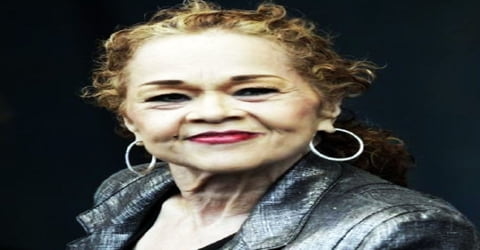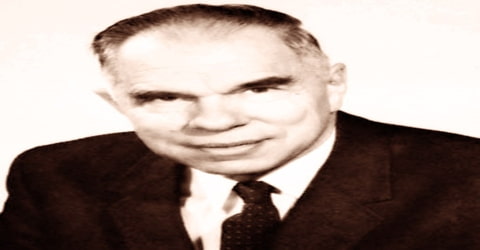Biography of Etta James
Etta James – American singer.
Name: Jamesetta Hawkins
Date of Birth: January 25, 1938
Place of Birth: Los Angeles, California, United States
Date of Death: January 20, 2012 (aged 73)
Place of Death: Riverside Community Hospital, Riverside, California, United States
Occupation: Singer
Mother: Dorothy Hawkins
Spouse/Ex: Artis Mills (m. 1969-2012)
Children: Donto James, Sametto James
Early Life
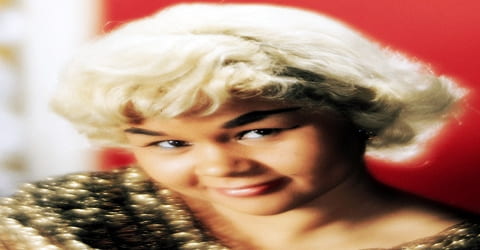
A popular American rhythm-and-blues entertainer who in time became a successful ballad singer, Etta James was born on January 25, 1938, in Los Angeles, California, to Dorothy Hawkins, who was 14 at the time. Her father has never been identified. James performed in various genres, including blues, R&B, soul, rock, and roll, jazz and gospel. Starting her career in 1954, she gained fame with hits such as “The Wallflower”, “At Last”, “Tell Mama”, “Something’s Got a Hold on Me”, and “I’d Rather Go Blind”. She faced a number of personal problems, including heroin addiction, severe physical abuse, and incarceration, before making a musical comeback in the late 1980s with the album Seven Year Itch.
By the age of 5, Etta James was known as a gospel prodigy, gaining fame by singing in her church choir and on the radio. At 12, she moved north to San Francisco, formed a trio and was soon working for bandleader Johnny Otis. Four years later, she recorded, Roll with Me Henry, with the Otis band. After signing with Chicago’s Chess Records her career began to soar. She continued to work with Chess throughout the 1960s and early ’70s. Sadly, heroin addiction affected both her personal and professional life. With suggestive stage antics and a sassy attitude, she continued to perform and record well into the 1990s. She possessed the vocal range of a contralto and was initially marketed as R&B and doo-wop singer but broke through as a traditional pop-styled singer, covering jazz and pop music standards. Always soulful, her extraordinary voice was showcased to great effect in singles such as, At Last, Dance With Me Henry and I’d Rather Go Blind. As she entered her 70s, Etta James began struggling with health issues and eventually succumbed to Leukemia.
James won six Grammy Awards and 17 Blues Music Awards. She was inducted into the Rock and Roll Hall of Fame in 1993, the Blues Hall of Fame in 2001, and the Grammy Hall of Fame in 1999. Rolling Stone magazine ranked James number 22 on its list of the 100 Greatest Singers of All Time; she was also ranked number 62 on its list of the 100 Greatest Artists of All Time.
Childhood, Family and Educational Life
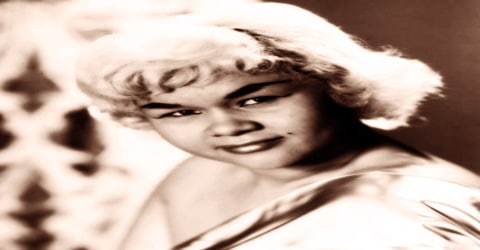
Etta James, original name Jamesetta Hawkins, was born on January 25, 1938, in Los Angeles to fourteen-year-old Dorothy Hawkins. She was brought -up by foster parents, Mama Lu, and Sarge who forced her to sing for his friends. James speculated that she was the daughter of pool player Rudolf “Minnesota Fats” Wanderone, whom she met briefly in 1987. Her mother was frequently absent from their apartment in Watts, conducting relationships with various men, and she referred to her mother as “the Mystery Lady”.
This singer recalled her mother’s advice, “My mother always told me, even if a song has been done a thousand times, you can still bring something of your own to it”.
James received her first professional vocal training at the age of five from James Earle Hines, musical director of the Echoes of Eden choir at the St. Paul Baptist Church, in South-Central Los Angeles. Under his tutelage, she suffered physical abuse during her formative years, with her instructor often punching her in the chest while she sang to force her voice to come from her gut. As a consequence, she developed an unusually strong voice for a child her age.
Personal Life
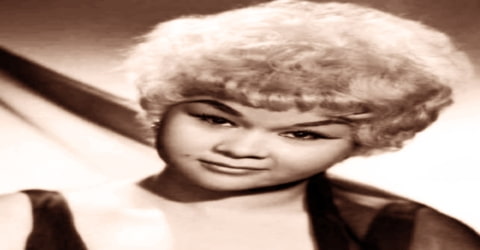
Etta James married Artis Mils in 1969 who remained her husband until her death. She had two sons Donto and Sametto, both of whom are performers. She was continuously in and out of rehabilitation centers.
In 1974, James was sentenced to drug treatment instead of serving time in prison. She was in the Tarzana Psychiatric Hospital for 17 months, at the age of 36, and went through a great struggle at the start of treatment. In her autobiography, she said that the time she spent in the hospital changed her life. After leaving treatment, however, her substance abuse continued after she developed a relationship with a man who was also using drugs. In 1988, at the age of 50, James entered the Betty Ford Center, in Rancho Mirage, California, for treatment. In 2010, she received treatment for a dependency on painkillers.
Career and Works
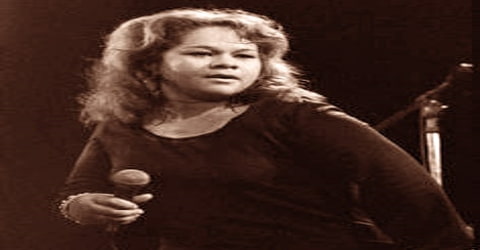
In 1950, James’s foster mother Mama Lu died, and James’s biological mother took her to the Fillmore district of San Francisco. Within a couple of years, she began listening to doo-wop and was inspired to form a girl group, the Creolettes (because of the members’ light-skinned complexions).
In 1952, James met musician Johnny Otis who helped the band sign to Modern Records and changing their name to the Peaches and gave the singer her stage name reversing Jamesetta into “Etta James”. Another story was that Otis spotted the Creolettes performing at a Los Angeles nightclub and sought for them to record his “answer song” to Hank Ballard’s “Work with Me, Annie”. James recorded the version, for which she was given credit as co-author, in 1954, and the record was released in early 1955 as “Dance with Me, Henry”. The original title of the song was “Roll with Me, Henry”, but it was changed to avoid censorship due to the off-color title (roll connoting sexual activity). In February of that year, the song reached number one on the Hot Rhythm & Blues Tracks chart. Its success gave the group an opening spot on Little Richard’s national tour.
The group’s song “Roll with Me Henry” (co-written by James and set to the music of Hank Ballard and the Midnighters’ suggestive hit “Work with Me, Annie”) was an instant success in 1954, but it was retitled “The Wallflower” because of its perceived sexual connotation; the lyrics and title were changed to “Dance with Me, Henry” for singer Georgia Gibbs’s 1955 rendition, which reached number one on the charts. After charting with a second R&B hit, “Good Rockin’ Daddy,” the Peaches broke up and James stepped out on her own.
James’ solo career was a slow starter, and she spent several years cutting low-selling singles for Modern and touring small clubs until 1960 when Leonard Chess signed her to a new record deal. James would record for Chess Records and its subsidiary labels Argo and Checker into the late ’70s and, working with producers Ralph Bass and Harvey Fuqua, she embraced a style that fused the passion of R&B with the polish of jazz, and scored a number of hits for the label, including “All I Could Do Was Cry,” “My Dearest Darling,” and “Trust in Me.” While James was enjoying a career resurgence, her personal life was not faring as well; she began experimenting with drugs as a teenager, and by the time she was 21 she was a heroin addict, and as the ’60s wore on she found it increasingly difficult to balance her habit with her career, especially as she clashed with her producers at Chess, fought to be paid her royalties, and dealt with a number of abusive romantic relationships. James’ career went into a slump in the mid-’60s, but in 1967 she began recording with producer Rick Hall at FAME Studios in Muscle Shoals, Alabama and, adopting a tougher, grittier style, she bounced back onto the R&B charts with the tunes “Tell Mama” and “I’d Rather Go Blind.”
Musician Bobby Murray toured with James for over 20 years. He wrote that James had her first hit single when she was 15 years old and went steady with B.B. King when she was 16. James believed that King’s hit single “Sweet Sixteen” was about her. In early 1955, she and an aspiring singer, the 19-year-old Elvis Presley, then recording for Sun Studios and an avid fan of King’s, shared a bill in a large club just outside Memphis. In her autobiography, she noted how impressed she was with the young singer’s manners. She also recalled how happy he made her many years later when she found out that it was Presley who had moved her close friend Jackie Wilson from substandard convalescent home to a more appropriate facility and, as she put it, paid all the expenses. Presley died a year later. Wilson went on to live for another ten years in the care center Presley found for him.
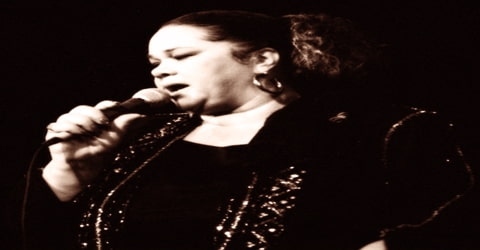
In 1960, James decided to sign with Leonard Chess’ label, Chess Records and shortly afterward got involved in a relationship with singer Harvey Fuqua, founder of the doo-wop group, The Moonglows. She recorded the hit ballad, My Dearest Darling, in 1960, to the accompaniment of string instruments, and sang background vocals on label mate Chuck Berry’s, Back in the U.S.A.
Her debut album, At Last!, was released in late 1960 and was noted for its varied selection of music, from jazz standards to blues to doo-wop and rhythm and blues (R&B). The album included the future classic “I Just Want to Make Love to You” and “A Sunday Kind of Love”. In early 1961, James released what was to become her signature song, “At Last”, which reached number two on the R&B chart and number 47 on the Billboard Hot 100. Though the record was not as successful as expected, her rendition has become the best-known version of the song. James followed that with “Trust in Me”, which also included string instruments. Later that same year, James released a second studio album, The Second Time Around. The album took the same direction as her first, covering jazz and pop standards and with strings on many of the songs. It produced two hit singles, “Fool That I Am” and “Don’t Cry Baby”.
In 1962, James began using gospel elements and, Something’s Got a Hold on Me, got to No.4 on the R&B chart while, Stop the Wedding, reached No.6 on the R&B charts. In 1963, she had another major hit with “Pushover” and released the live album Etta James Rocks the House, recorded at the New Era Club in Nashville, Tennessee. After a couple of years of minor hits, James’s career started to suffer after 1965.
In 1967 James hit the charts again with the searing soul song “Tell Mama.” The album included her version of Otis Redding’s Security, and I’d Rather Go Blind, regarded a blues classic. She continued to make the Top 40 R&B charts with singles such as “Losers Weepers and “I Found a Love, but was devastated by the death of Chess founder Leonard Chess. Her self-titled album in 1973 was notable for its rock and funk styles, produced by the renowned rock producer Gabriel Mekler and nominated for a Grammy but did not do well commercially. James left Chess in 1976 and began recording for other labels and touring. She was the opening act for the Rolling Stones in the late 1970s and early ’80s.
In 1978, longtime fans the Rolling Stones paid homage to James by inviting her to open some shows for them on tour, and she signed with Warner Bros., cutting the album Deep in the Night with producer Jerry Wexler. While the album didn’t sell well, it received enthusiastic reviews and reminded serious blues and R&B fans that James was still a force to be reckoned with. By her own account, James fell back into drug addiction after becoming involved with a man with a habit, and she went back to playing club dates when and where she could until she kicked again thanks to a stay at the Betty Ford Center in 1988. That same year, James signed with Island Records and cut a powerful comeback album, Seven Year Itch, produced by Barry Beckett of the Muscle Shoals Rhythm Section. The album sold respectably and James was determined to keep her career on track, playing frequent live shows and recording regularly, issuing Stickin’ to My Guns in 1990 and The Right Time in 1992.
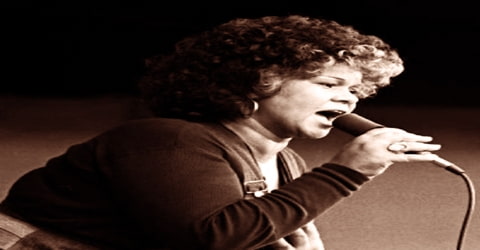
Though James continued to perform, little was heard of James until 1984, when she contacted David Wolper and asked to perform in the opening ceremony of the 1984 Summer Olympics, at which she sang “When the Saints Go Marching In”. In 1987, she performed “Rock & Roll Music” with Chuck Berry in the documentary film Hail! Hail! Rock ‘n’ Roll. After a ten year battle with drug addiction and alcoholism, James released two albums in 1989 – Seven Year Itch and Stickin’ to My Guns, produced by Barry Becket and recorded at Fame Studios.
James participated with the rap singer Def Jef on the song “Droppin’ Rhymes on Drums”, which mixed James’s jazz vocals with hip-hop. In 1992, she recorded the album The Right Time, produced by Jerry Wexler for Elektra Records. She was inducted into the Rock and Roll Hall of Fame in 1993. James signed with Private Music Records in 1993 and recorded a Billie Holiday tribute album, Mystery Lady: Songs of Billie Holiday. The album set a trend of incorporating more jazz elements in James’s music. The album won James her first Grammy Award, for Best Jazz Vocal Performance, Female, in 1994. In 1995, her autobiography, A Rage to Survive, co-written with David Ritz, was published. Also in 1995, she recorded the album Time After Time. A Christmas album, Etta James Christmas, was released in 1998. By the mid-1990s, James’s earlier classical music was being used in commercials, including “I Just Wanna Make Love to You”. After an excerpt of the song was featured in a Diet Coke advertising campaign in the UK, it reached the top ten on the UK charts in 1996.
Between 2000 and 2011, James released albums including, Matriarch of the Blues, Blue Gardenia, Let’s Roll, and The Dreamer. She made her final television appearance performing “At Last” on Dancing with the Stars. In 2003, James published an autobiography, Rage to Survive: The Etta James Story, and in 2008 she was played onscreen by modern R&B diva Beyoncé Knowles in Cadillac Records, a film loosely based on the history of Chess Records. Knowles recorded a faithful cover of “At Last” for the film’s soundtrack, and later performed the song at Barack Obama’s 2009 inaugural ball; several days later, James made headlines when during a concert she said “I can’t stand Beyoncé, she had no business up there singing the song that I’ve been singing forever.” (Later the same week, James told The New York Times that the statement was meant to be a joke “I didn’t really mean anything…even as a little child, I’ve always had that comedian kind of attitude” but she was saddened that she hadn’t been invited to perform the song.)
Etta James performed at the top jazz festivals in the world, such as the Montreux Jazz Festival in 1977, 1989, 1990 and 1993. She performed nine times at the legendary Monterey Jazz Festival and five times at the San Francisco Jazz Festival. She performed at the Playboy Jazz Festival in 1990, 1997, 2004, and 2007. She performed at the New Orleans Jazz & Heritage Festival in 2006, 2009, and 2012. She also often performed at free summer arts festivals throughout the United States.
Over the years James’s voice changed rowing rougher and deeper and losing its little-girl quality and she became one of the first women to sing in the style that became soul. She continued to perform into the early 21st century.
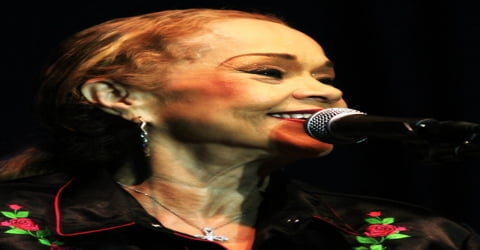
In April 2009, at the age of 71, James made her final television appearance, performing “At Last” on the program Dancing with the Stars. In May 2009, she received the Soul/Blues Female Artist of the Year award from the Blues Foundation, the ninth time she won the award. She carried on touring but by 2010 had to cancel concert dates because of her gradually failing health, after it was revealed that she was suffering from dementia and leukemia. In November 2011, James released her final album, The Dreamer, which was critically acclaimed upon its release. She announced that this would be her final album. Her continuing relevance was affirmed in 2011 when the Swedish DJ Avicii achieved substantial chart success with the song “Levels”, which samples her 1962 song “Something’s Got a Hold on Me”. The same sample was used by the rapper Flo Rida in his 2011 hit single “Good Feeling”. Both artists issued statements of condolence upon James’s death.
Awards and Honor
Etta James received awards and recognitions from eight different organizations, including the Rock and Roll Hall of Fame and Museum. In 2003, she was honored with a Walk of Fame star at 7080 Hollywood Blvd.
In 2004, Rolling Stone magazine ranked her number 62 on its list of the 100 Greatest Artists of All Time.
James was awarded Grammy for Best Jazz Vocal Performance for the album Mystery Lady, and two more for, Let’s Roll, and, Blues to the Bone, for Best Contemporary and Traditional Blues Albums categories respectively. Two of her songs were given Grammy Hall of Fame Awards for “qualitative or historical significance- At Last, and, Dance with Me, Henry. In 2003, she was given the Grammy Lifetime Achievement Award.
The members of the Blues Foundation, set up in Memphis, Tennessee, awarded her Blues Female Artist of the Year award 14 times and inducted her into the Blues Hall of Fame.
Death and Legacy
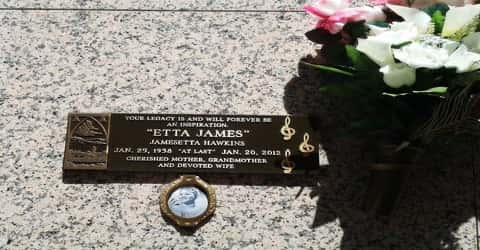
In 2010, James was hospitalized with MRSA-related infections, and it was revealed that she had received treatment for dependence on painkillers and was diagnosed with Alzheimer’s disease, which her son claimed was the likely cause of her outbursts regarding Knowles. She was diagnosed with leukemia in early 2011.
Etta James died on January 20, 2012, five days before her 74th birthday, at Riverside Community Hospital in Riverside, California. Her death came three days after that of Johnny Otis, the man who had discovered her in the 1950s. Thirty-six days after her death, her sideman Red Holloway died. Her funeral was presided over by Reverend Al Sharpton and took place in Gardena, California eight days after her death. Stevie Wonder, Beyoncé, and Christina Aguilera each gave a musical tribute. She was buried at Inglewood Park Cemetery in Los Angeles County, California.
The Wallflower or Dance with Me, Henry, written by Johnny Otis, Hank Ballard, and Etta James was recorded by her for Modern Records in 1955 and topped the U.S. R&B chart for 4 weeks. James’ 1960 debut album, At Last! is noted for its musical variety of jazz, blues, doo-wop, and R&B numbers, included, I Just Want to Make Love to You, and, A Sunday Kind of Love. In 1993, James recorded the tribute album, Mystery Lady: Songs of Billie Holiday, and began to incorporate more jazz elements and won for her a first Grammy Award for best jazz vocal performance.
Information Source:
